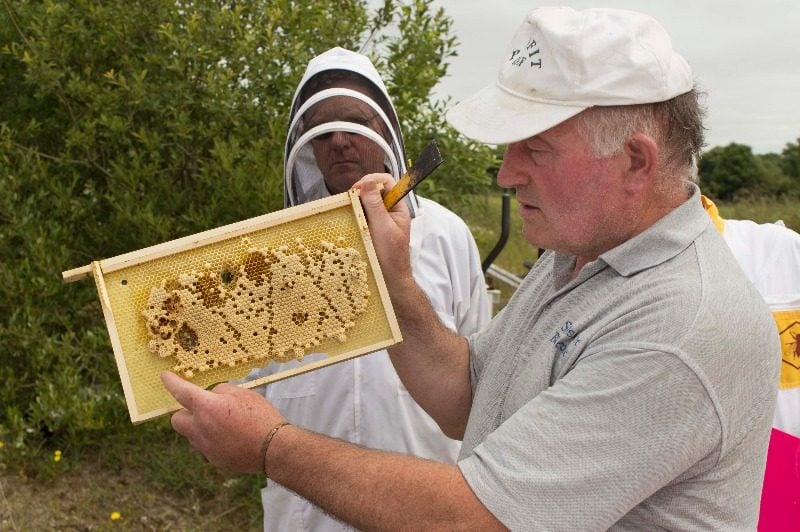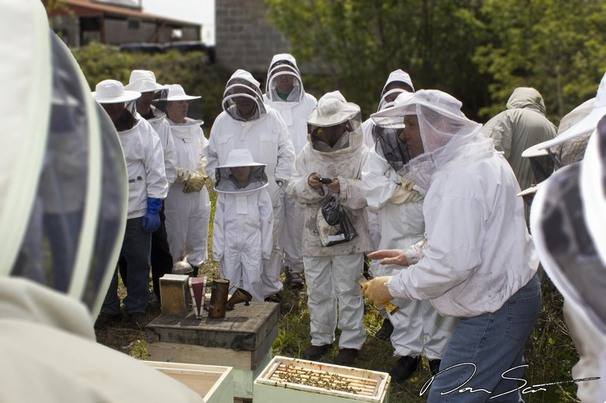Beekeeper Education
Oideachas Beachairí

Hands on Beekeeper Eduation
To advance the Connemara Beekeepers mission of educating it’s members and the public about the value of honeybees and the impact honeybees have on our world, the Association regularly run beekeeper training courses, field trips to Association apiaries as well as run educational webinars for the benefit of all it’s members.
Every year Connemara Beekeepers run an introductory “Beginners Course in Beekeeping” which provides students with an overview of equipment required, honeybee lifecycle, pest and diseases and honey harvesting. The course is run over a number of weeks in late winter / early spring and gives students a fantastic foundation in beekeeping.
Apiary Visits
Apiary visits are an important part of a beginners beekeeping education. You may read all the beekeeping books available but very little beats watch an experienced beekeeper at work. You will also get some hands-on experience. Connemara Beekeepers Association have a number of apiaries spanning the whole of Connemara from Inverin, Maam, Letterfrack and Clifden and we routinely have apiary visits (weather permitting) during the summer that will enable you to meet like minded beekeeping enthusiast and where you can have your questions answered. If the location doesn’t suit you are free to wait until a visit to an apiary closer to you has been scheduled.

Online Meetings and Webinars
As well as apiary visits Cumann Beachairi Chonamara often run educational Q&A’s where experienced beekeepers answer burning questions new beekeepers might have. Even if you don’t think of a question someone else might ask something you hadn’t even considered. Even an experienced beekeeper is liable to pick up little nuggets of information at every meeting! Along with these Q&A meetings education webinars are scheduled, where an experienced beekeeper or expert gives a presentation on a certain aspect of beekeeping. Topics can range from Queen rearing, nuc building to diseases and how to spot them. A very valuable learnig tools that shouldn’t be missed if at all possible.
Bee swarming
“A swarm in May is worth a load of hay, A swarm in June, a silver spoon, but a swarm in July is not worth a fly.”
Bee swarming is a common phenomenon in bee colonies that occurs when the population of a hive grows too large, resulting in the creation of a new colony. This behavior is a crucial part of the reproductive process for bees and helps to ensure the survival of the species.
When a colony reaches a certain size, the old queen bee will leave the hive with a large group of worker bees. The swarm will fly to a nearby location, usually a branch or other sheltered object, where they will gather in a mass while scout bees search for a suitable location to establish a new hive. The swarm will stay at this location until a new home is found and the queen bee has laid a sufficient number of eggs to ensure the survival of the new colony.
Swarming is a cooperative effort between the workers, the old queen, and the new virgin queen who will eventually take her place as the leader of the new colony. The workers protect the queen, feed her, and assist in the construction of the new hive while the new queen mates with drones from other colonies to ensure genetic diversity in the new population.
Bee swarming can be a challenge for beekeepers, as it can reduce the size of their existing colonies and result in a loss of honey production. To prevent swarming, beekeepers can regularly inspect their hives and remove any signs of swarm cells, which are special chambers where the new queen is reared. They can also provide additional space for the colony to prevent overcrowding and ensure the proper ventilation of the hive.
Swarming is an important part of the life cycle of honeybees, and it plays a critical role in the survival and reproduction of the species. Beekeepers must understand this behavior and take steps to manage it in order to ensure the health and productivity of their colonies. By understanding and supporting bee swarming, we can help to protect these important pollinators and ensure the continued health of our ecosystems.
Buíochas le / Thank you to Jill Ui Dhuinn Bhig for supplying the video.